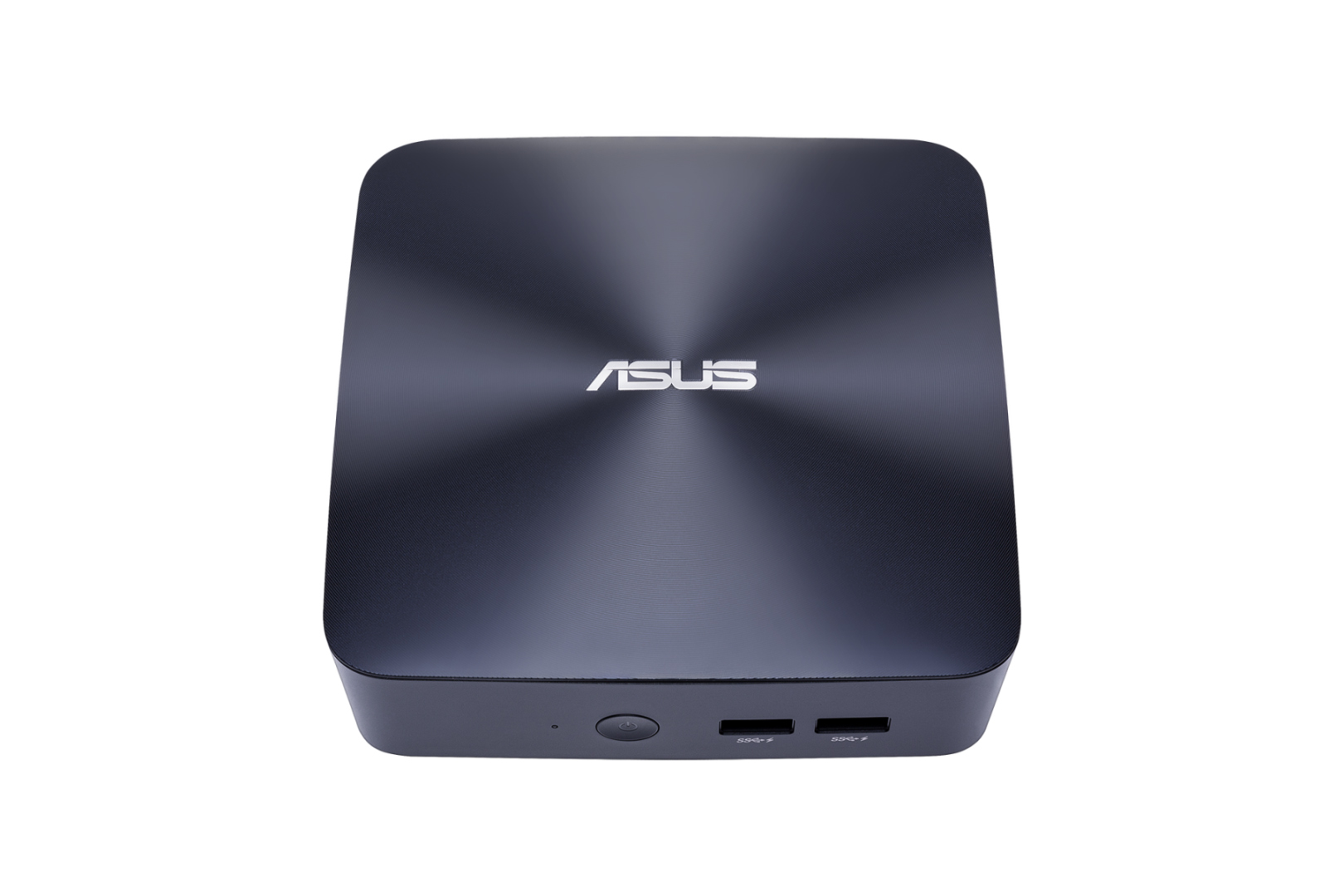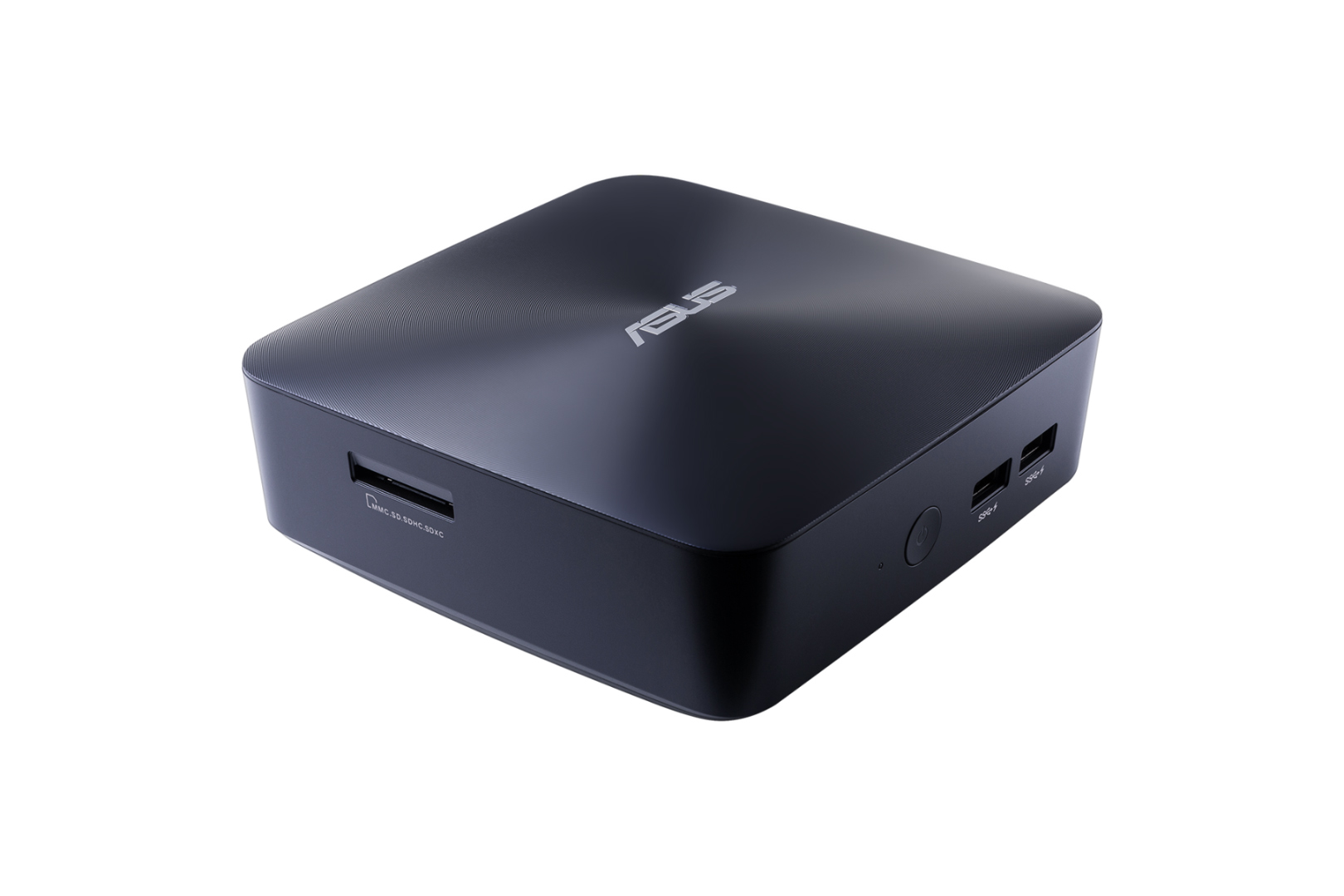Just ahead of the CES 2017 convention in Las Vegas, Asus revealed its assault on the general and business markets spanning laptops, monitors, desktops, and more. In this edition we are covering new mini PCs, three desktop monitors, and the company’s jump into the mesh-based wireless networking arena. Unfortunately, we don’t have specific hardware details for now, but a general list of features the company provided prior to the official product reveal.
That said, the earliest product availability is in February with the VivoMini VC66 Mini PC. All other product releases are listed as the first, second, and third quarters of 2017, hence why some of the hardware details aren’t provided. Everything here seems to be focused on professionals although the company’s new networking product can be used in a home or office environment.
So here we go!
VivoMini UN65U
This device aims at the home and office sporting a Zen-inspired spin-metal-effect finish and smooth, rounded corners. It’s an ultra-compact miniature PC capable of producing a 3840 x 2160 resolution thanks to the latest seventh-generation Kaby Lake Core processors from Intel. It measures 5.15 x 5.15 x 2.04 inches and weighs a mere 1.54 pounds, making it extremely small and lightweight. It includes VESA mounting on the back too for sticking it under a desk or behind a monitor.
While we don’t have specific hardware details, Asus will provide owners of this model with its Business Manager suite of apps and functions to easily update apps, drivers, and the BIOS. Businesses can customize the BIOS to load up their logo when booting the device, backup data, manage the power settings, and set passwords to the USB ports. The mini PC also comes packed with two USB ports on the front to easily connect peripherals and storage devices.
Here’s a brief bullet list of the highlights provided by Asus:
- DDR4 system memory
- Dual-storage bay design
- Up to 1TB 2.5 inch HDD, up to 512GB M.2 PCIe SSD
- Wireless AC connectivity
- Extensive array of connectivity options
- Asus-exclusive Media Streamer, Remote Go!
- Price: $275 to $449
- Availability: Q1 2017
VivoMini VM65 Series

Asus doesn’t provide any details regarding this series, only stating that the higher-end models will be powered by up to a seventh-generation Kaby Lake Intel Core i7 processor and a discrete Nvidia GeForce 930M graphics chip featuring Optimus technology. That essentially means the device will switch between the integrated Intel graphics and Nvidia’s GeForce chip for maximum performance when needed, such as switching over to the 930M for graphics-intensive scenarios.
One other notable feature regarding this series is that they will have a dual-bay design for different storage configurations, depending on the model. Only 2.5-inch hard disk drives and solid state drives are supported although Asus doesn’t specify the capacity limits. There’s also a USB 3.1 Type-C port for expanding the VM65’s capabilities.
Here’s another bullet list:
- 4K UHD
- Asus SonicMaster-enhanced audio
- DDR4 system memory
- Wireless AC
- Price: $549
- Availability: Q1 2017
VivoMini VC66 Series

This series is based on a 5 x 5 inch Mini-STX motherboard design, meaning their overall form factor is quite small. Again, we don’t have specific hardware details, so the resulting size of the VC66 PCs is unknown for now. However, they’re capable of up to three internal storage devices and optical drive configurations, such as one M.2 SSD and two 2.5-inch SSDs. The VC66 includes built-in RAID support too.
Finally, this series will consist of seventh-generation Kaby Lake processors from Intel, and Asus LANGuard protection. This feature will protect the VC66 series PCs from static-electric discharge and lightning strikes when they’re wired via Ethernet to the local network.
Here are a few more general features:
- DDR4 system memory
- Four USB 3.0 ports on the front
- HDMI, DisplayPort, and DVI video output
- Price: $499 to $799
- Availability: February 2017
Designo Curve MX38VQ

This is the latest model in the company’s Designo Curve MX Series, a 37.5-inch monitor sporting a frameless design and a 2300R curvature. To better understand this number, a high curve has a low number and a low curve has a high number. Thus, a panel with a 1900R curve would be more parenthesis shaped than a panel with a 3800R curvature, which would be rather subtle. This new panel from Asus fits nicely between the two.
The MX38VQ is based on In-Plane Switching (IPS) panel technology, which is newer than the older, more generally used Twisted Nematic (TN) technology. Most customers have used the latter given that it’s been around for so long, offering high brightness levels and fast response times. IPS tech is better known for its wide viewing angles and color brilliance, making it great for graphic designers and video streaming. TN panels are better suited for gaming.
Here are a few more details provided by Asus:
- 3840 x 2160 resolution
- 21:9 aspect ratio
- 2x 8-watt speakers with Harman Kardon and Asus SonicMaster tech
- Qi wireless charging built into the stand
- Silver metallic finish
- Sundial-inspired glass base
- Price: $1,099
- Availability: Q3 2017
ProArt PA32U / PA27AQ Monitors

Honestly, Asus doesn’t really talk about the PA27AQ monitor, only stating that it sports a 2560 x 1440 resolution, 100 percent coverage of the sRGB color space, and support for Thunderbolt 3. We presume it’s a 27-inch variant of the PA32U monitor, which features a bigger 32-inch screen and supports Thunderbolt 3 as well. Both aren’t expected to arrive until the third quarter of 2017, so Asus may still be hammering out the technical details.
What we know of the 32-inch model is that Asus deems it as the world’s first professional direct-lit HDR monitor with a 3840 x 2160 resolution. It includes full-array LED backlighting with 384 LED zones, enabling the panel to reach a whacky brightness level of 1,000 nits. It also supports several color spaces including Adobe RGB (99.5 percent), Rec. 2020 (85 percent), sRGB (100 percent), and DCI-P3 (95 percent).
Finally, both panels will be sold with Asus ProArt Calibration Technology with color-accuracy tuning. This includes an internal scaler chip that will save all color parameter profiles so that the settings are kept when changing devices.
Here are a couple of additional details:
- Thunderbolt 3 (USB Type-C) capable of daisy-chaining
- DisplayPort 1.2 capable of daisy-chaining
- Price: $1,799 to $1,999
- Availability: Q3 2017
HiveSpot and HiveDot Networking

This is the company’s dive into mesh-based wireless networking, meaning customers won’t have a single router attempting to cover the entire household, but several units that create a single blanket of coverage. One unit connects directly to the ISP’s modem while the other units serve as “nodes,” connecting directly to the base unit, creating one huge single connection. Even more, customers can effortlessly purchase and install additional nodes to expand the coverage without disrupting the entire network.
Asus offers two versions: HiveSpot with three bands (AC2134) and HiveDot offering only two (AC1300). Don’t let that tri-band aspect fool you: HiveSpot’s additional 5GHz band only serves as a direct, dedicated connection between units for better network performance, especially in multi-floor configurations. Otherwise, both versions provide speeds of up to 867 megabits per second on the 5GHz band and up to 433 megabits per second on the 2.4GHz band.
HiveSpot-specific features include seven integrated “smart” antennas and the company’s built-in AiProtection suite powered by Trend Micro. This platform detects, blocks, and neutralizes security threats before they reach connected devices. Other general features shared by both models include gigabit Ethernet connectivity and Asus AIRadar beamforming technology.
Here are the remaining details:
- Requires three nodes and supports up to five
- Any unit can be configured as the main hub or a node
- One can be connected to an existing network router via a wired connection
- Configuration through Hive mobile app
- Mobile app includes Smart Family Insights parental controls
- Price: $299 to $399
- Availability: Q2 2017


